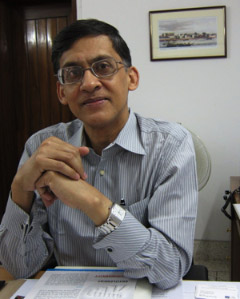12 April 2017, by Manzoor Hasan.

At the beginning of 2017 we have seen tremendous changes in politics in the West. From President Trump taking office in the White House to the United Kingdom’s triggering of Article 50, notifying the European Union of its intention to leave, the implications of these changes are yet to be fully felt or understood.
What we do know, however, is that in the present context, civil society must work harder than ever to promote and protect approaches to global cooperation. Nowhere is this more important than in the area of anti-corruption.
Grand corruption and laundering its proceeds
If recent grand corruption scandals tell us anything it is that transnational corruption thrives on the failure of states to cooperate on oversight and enforcement. From the 1MDB case in Malaysia and Odebrecht in Latin America to the laundering of Russian money in UK banks – significant amounts of stolen money can cross international borders with ease.
Once these funds reach new shores they can be laundered into legitimacy through business investments, high-end property or other purchases with the assistance of gatekeepers, such as financial institutions, lawyers or accountants. Sometimes unwittingly, but often with complicity, gatekeepers fail to apply due diligence to large sums of money from overseas, including failing to identify the beneficial owners of the legal entities they are working with.
This means that the proceeds of corruption benefit and enrich the corrupt – too often at the expense of the citizens of developing countries from which the money was stolen in the first place.
The second cycle of the UNCAC review mechanism covers preventive measures (chapter II) and asset recovery (chapter V), including anti-money laundering measures. This will undoubtedly provide us with insights into the strengths and weaknesses of existing frameworks for preventing grand corruption and laundering its proceeds and impetus for making improvements.
Asset recovery and management of returned assets
Once large sums are deposited abroad, efforts to repatriate them and ensure that they are returned to their rightful owners is a complex process that is difficult to manage. While countries around the globe have committed to working together to enable asset recovery, including through mutual legal assistance, experience shows that this is far from simple.
Beyond the technicalities of cooperation for repatriating the proceeds of corruption, there is also the question of what to do with assets once they are returned. This was the focus of an expert meeting in Addis Ababa, Ethiopia from 14-16 February 2017, on “the management and disposal of recovered and returned stolen assets”. It will also be a focus of the Global Forum on Asset Recovery due to take place in Washington D.C. in July 2017.
As a contribution to these deliberations, the UNCAC Coalition’s Working Group on Accountable Asset Return published a letter to the Addis meeting in February, signed by 37 Coalition member organisations. It emphasised the need for returned assets to be managed transparently and accountably in line with UNCAC Article 9, and it urged that they be used for the “meaningful implementation of SDG 16 and to compensate the poorest sections of society most harmed by corruption”.
UNCAC reviews, SDGs and civil society
The first year of UNCAC reviews of UNCAC chapters II and V – covering 30 countries in all regions – concludes in June and will offer an opportunity for a first stocktake of the second cycle of reviews.
Our experience shows that civil society participation in the reviews and follow up is essential for maintaining momentum and ensuring that the fight against corruption has meaningful positive impacts for our most vulnerable communities. In recognition of this fact, 18 countries now support the Coalition’s Transparency Pledge, which calls for transparency and the participation of civil society in the UNCAC Review Mechanism.
Likewise, in the context of the SDGs’ linkage between corruption and development, civil society is uniquely positioned to contribute to helping to identify where harm has been done and the most effective remedies.
While the SDGs do not specifically address grand corruption – indicators under SDG 16 are linked to petty corruption and bribery offences – this is an area in which civil society can work to illustrate the convincing link between elite individual enrichment and under-development, as well as the contribution that could be made to meeting the SDGs if more assets were successfully recovered.
In June, we will participate in the UNODC 8th session Implementation Review Group Briefing for NGOs in Vienna and are looking forward once more to a lively exchange with representatives of States Parties on anti-corruption topics of key importance to the international community.
About the author
Manzoor Hasan is Chair of the UNCAC Coalition and represents the South Asian Institute of Advanced Legal and Human Rights Studies (SAILS) on the UNCAC Coalition Coordination Committee.



